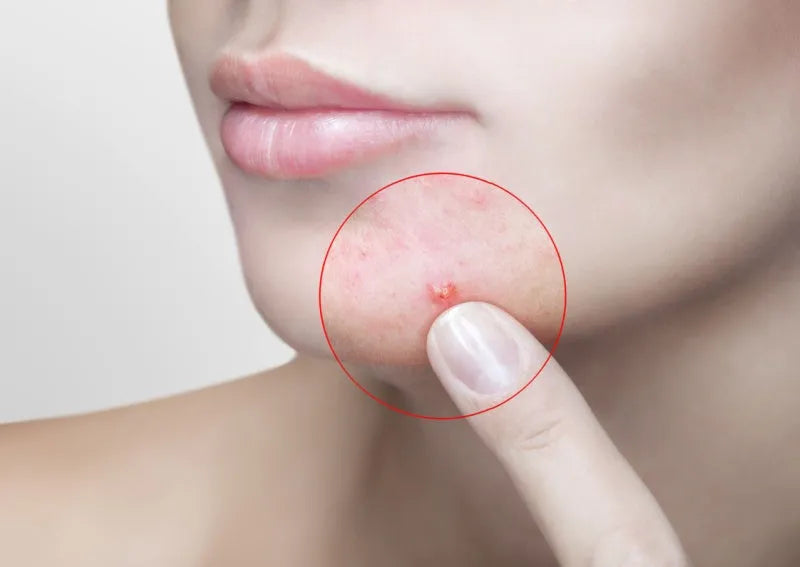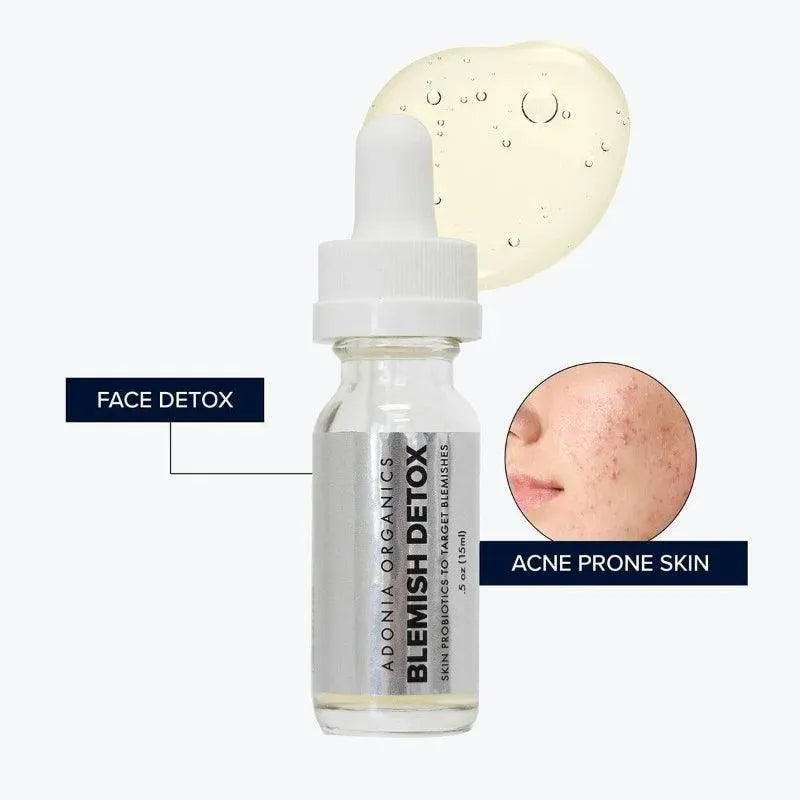
To Eliminate Acne—Ingredients Really Matter
Having acne-prone skin can be challenging, especially when it comes to choosing the right skincare products. While many ingredients can help manage and reduce acne, certain substances can exacerbate the condition. Understanding which ingredients to avoid is crucial for maintaining clear and healthy skin.
Ingredients to Avoid
Comedogenic Oils
Comedogenic oils are oils that clog pores, leading to the formation of blackheads and pimples. Some common comedogenic oils include:
 Coconut Oil: While nourishing for dry skin, coconut oil is highly comedogenic and can clog pores, making it unsuitable for acne-prone skin.
Coconut Oil: While nourishing for dry skin, coconut oil is highly comedogenic and can clog pores, making it unsuitable for acne-prone skin.Alcohol-Based Products
Alcohol-based products can strip the skin of its natural oils, leading to dryness and irritation. For acne-prone skin, this can trigger the sebaceous glands to produce more oil, resulting in more breakouts. Ingredients to watch out for include:

- Ethanol also known as ethyl alcohol, is a colorless, volatile, flammable liquid. It is the type of alcohol found in alcoholic beverages and is also used as a fuel and industrial solvent.
- Isopropyl Alcohol also known as isopropanol or 2-propanol, is a colorless, flammable chemical compound with a strong odor. It is commonly used as a disinfectant and antiseptic due to its ability to kill bacteria, fungi, and viruses.
- Denatured Alcohol is ethanol that has been treated with additives to make it unfit for human consumption. Denatured alcohol is widely used as a solvent and cleaning agent in various industries. It is found in products like antifreeze, lacquers, shellacs, and varnishes. Despite its usefulness, denatured alcohol is hazardous if ingested, inhaled, or absorbed through the skin, due to the toxic nature of the denaturants.
Fragrances and Dyes
Fragrances and synthetic dyes are common allergens and irritants that can exacerbate acne and other skin conditions. Even products labeled "unscented" may contain fragrance chemicals that mask odors. It's best to choose fragrance-free and dye-free products to minimize the risk of irritation.
Sulfates

Sulfates, such as sodium lauryl sulfate (SLS) and sodium laureth sulfate (SLES), are harsh detergents that can strip the skin of its natural moisture. This can lead to an imbalance in oil production and potentially worsen acne. Avoiding sulfates in cleansers and shampoos is advisable for acne-prone skin.
Silicones
Silicones, such as dimethicone and cyclopentasiloxane, are often used in skincare products to provide a smooth texture and a protective barrier. However, they can trap dirt, oil, and dead skin cells, leading to clogged pores and breakouts. Opt for silicone-free products to keep your pores clear.
Parabens
Parabens are preservatives commonly found in cosmetics and skincare products. They can mimic estrogen in the body, potentially disrupting hormone levels and triggering acne in some individuals. Look for products labeled "paraben-free" to avoid this risk.

Heavy Emollients
Heavy emollients like mineral oil, petroleum jelly, and lanolin can create an occlusive layer on the skin, trapping bacteria and sebum. This can lead to clogged pores and acne breakouts. Choose lighter, non-comedogenic moisturizers instead.
Best Skincare Routine for Acne-Prone Skin
Creating an effective skincare routine is essential for managing acne-prone skin. Here's a simple yet effective routine to follow:
Cleansing
Start with a gentle, sulfate-free cleanser to remove dirt, oil, and makeup without stripping your skin. Look for ingredients like salicylic acid or benzoyl peroxide, which can help treat acne.
Example: A gel-based cleanser with salicylic acid can help exfoliate and unclog pores.
Toning
Using a toner can help balance your skin's pH and remove any residual impurities. Opt for an alcohol-free toner with soothing ingredients like witch hazel or rose water.
Example: A witch hazel toner can help reduce inflammation and tighten pores.
Treatment

Apply a targeted acne treatment containing ingredients like benzoyl peroxide, salicylic acid, or tea tree oil. These can help reduce inflammation and kill acne-causing bacteria.
Try Adonia Organics Blemish Detox
- Naturally restores a healthy complexion
- Prevents acne and breakouts
- Minimize the appearance of pores
- Minimizes the appearance of blackheads
- Probiotics help prevent future outbreaks
- Does not dry out skin
- Levels out uneven skin texture
- Promotes new collagen production causing acne scars to diminish
Example: A spot treatment with benzoyl peroxide can effectively reduce the size and redness of pimples.
Moisturizing
Even if you have oily or acne-prone skin, moisturizing is essential to keep your skin hydrated and healthy. Choose a lightweight, non-comedogenic moisturizer.
Example: A gel-based moisturizer with hyaluronic acid provides hydration without clogging pores.

Sun Protection
Using sunscreen daily is crucial, especially if you're using acne treatments that make your skin more sensitive to the sun. Choose a broad-spectrum, oil-free sunscreen with at least SPF 30.
Example: A mineral sunscreen with zinc oxide offers protection without causing breakouts.
Exfoliation
Exfoliating 1-2 times a week can help remove dead skin cells and prevent clogged pores. Use a gentle exfoliant with ingredients like salicylic acid or alpha hydroxy acids (AHAs).
Example: A chemical exfoliant with glycolic acid can help improve skin texture and reduce acne scars.
Organic Ingredients Beneficial for Acne-Prone Skin
Incorporating organic ingredients into your skincare routine can provide gentle and effective care for acne-prone skin. Here are some beneficial options:
Tea Tree Oil
Tea tree oil has antibacterial and anti-inflammatory properties, making it an excellent choice for treating acne. It's often used as a spot treatment to reduce the size and redness of pimples.

Aloe Vera
Aloe vera is soothing and hydrating, helping to calm inflamed skin and promote healing. It can be used as a moisturizer or as a soothing treatment for irritated areas.
Witch Hazel
Witch hazel is a natural astringent that helps reduce inflammation, tighten pores, and control oil production. It's often used as a toner for acne-prone skin.
Green Tea Extract
Green tea extract is rich in antioxidants and has anti-inflammatory properties. It can help reduce sebum production and soothe irritated skin.
Jojoba Oil

Jojoba oil closely resembles the skin's natural sebum, making it an excellent moisturizer for acne-prone skin. It helps balance oil production and provides hydration without clogging pores.
Honey
Honey has natural antibacterial properties and is a humectant, meaning it helps retain moisture. It's great for soothing and hydrating the skin while fighting acne-causing bacteria.
Chamomile
Chamomile has anti-inflammatory and soothing properties, making it beneficial for reducing redness and irritation in acne-prone skin.
Always Check Your Labels
Navigating skincare products for acne-prone skin can be challenging, but knowing which ingredients to avoid and which ones to embrace can make a significant difference. By steering clear of comedogenic oils, alcohol-based products, and other potential irritants, and instead choosing gentle, non-comedogenic, and organic ingredients, you can help maintain a clearer complexion. Establishing a consistent skincare routine with cleansing, toning, treatment, moisturizing, and sun protection is also key to managing and preventing acne. Remember, everyone's skin is unique, so it may take some trial and error to find the best products and routine for your specific needs.
